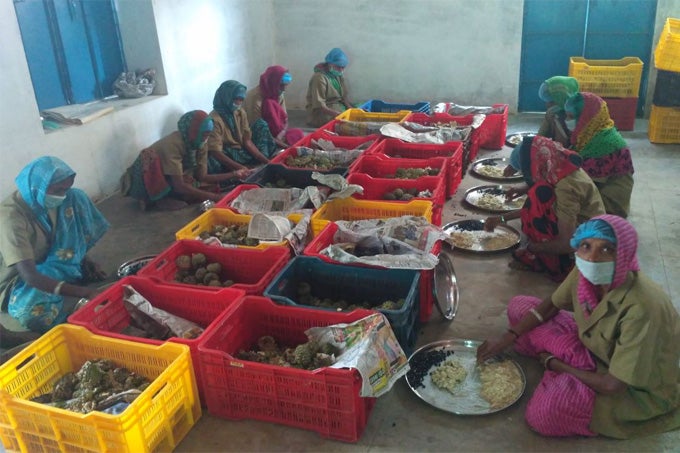
Pehle mein apne ghar ka paanch hazaar (rupaye) mein bhi kharcha nahi chala paati thi, abh mein pandrah hazaar rupaye mein ghar ka kharcha chalati hu.
“Earlier I was not able to contribute even Rs. 5,000 ($69) to run my house. Today, I contribute Rs. 15,000 ($208),” beams Lakshmi Amol Shinde from Wardha Lakshmi as she recalls the harsh financial conditions she and her family faced after her husband lost his job.
This unexpected event motivated her to join a self-help group (SHG) and take out a loan to start a small snack (papad) business .
Initially, she sold her food delicacies in her village. Later, she expanded her business and catered to shops in Nagpur, Maharashtra’s winter capital.
Her hard work paid off, and eleven women from her group joined Lakshmi’s flourishing business .
Thanks to business and marketing training, the women’s business has grown and is now processing the famous turmeric from Waigaon, another town in the district.
By moving up the value chain, the women are running a profitable business.
Babli Devi, a tribal woman from Udaipur district of Rajasthan, has a similar life-changing story.
Speaking at ease in her local dialect, she explained how, four years ago, her family and neighbors collected and sold custard apples for a mere Rs 2 ($0.02) per kg.
Today, Babli Devi works in a custard apple pulp extraction unit, and earns close to Rs 10,000 ($139) a month .
Members of her self-help group received training from the Agriculture University in Udaipur on the custard apple value chain. The unit is now registered as a producer company.
They took out a loan of Rs. 5 lakhs ($6,944) to set up a custard apple pulp extraction unit and established 16 collection centers to purchase custard apple at Rs 10 per (~$0.14) kg from 1,200 families.
Today, the unit employs 150 women . The company sells the pulp to ice-cream companies and catering units and yields a 40-50% profit margin.

Lakshmi Amol Shinde and Babli Devi exemplify how Indian women have leveraged the strength of their community institutions to reverse their dire situations and secure a better future for themselves and their families.
Both women received support from the National Rural Livelihoods Mission (NRLM), a program under the Ministry of Rural Development (MoRD), which has organized about 56 million women into SHGs, thereby leveraging over $30 billion in loans in the last five years.
In short, NRLM’s focus on social and financial inclusion has provided an impetus to women entrepreneurs to invest in their businesses and contribute toward a financially stable future.
Recognizing the growing need for business advisory support and access to affordable and timely finance, the Government of India, along with the World Bank, is implementing a $500 million investment through the National Rural Economic Transformation Project (NRETP).
The project recently coordinated with United Nations Development Program and other stakeholders such as impact investors, social enterprises, fintech firms, e-commerce players, and incubators at a consultation on rural enterprise development.
The event featured stimulating discussions on new avenues for promoting businesses through e-marketplaces, leveraging technology for advisory services, and accessing products and processes of various financial institutions catering to women-owned micro-enterprises.
The NRETP plans to support these efforts through various web-based platforms, interactive mobile applications, face-to-face mentoring as well as through access to business-specific financial products.
A combination of young professionals with management expertise and local entrepreneurs trained in mentoring will deliver support services such as access to credit, technology, skills and links to markets.
With initiatives such as these in the offing, the growth of transformative women-led enterprises in rural India has begun .



Join the Conversation